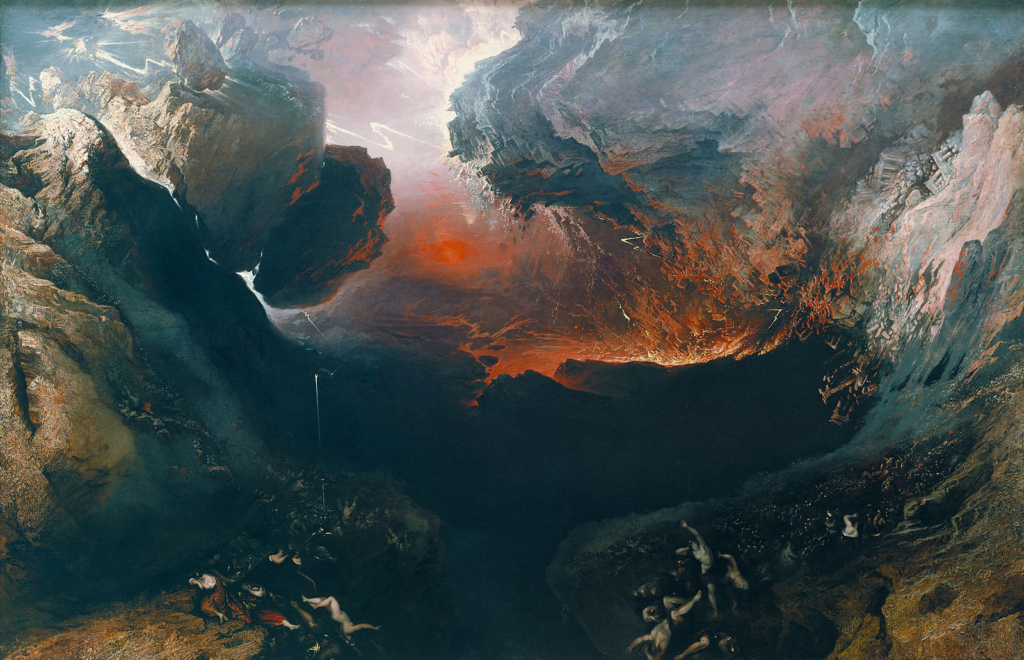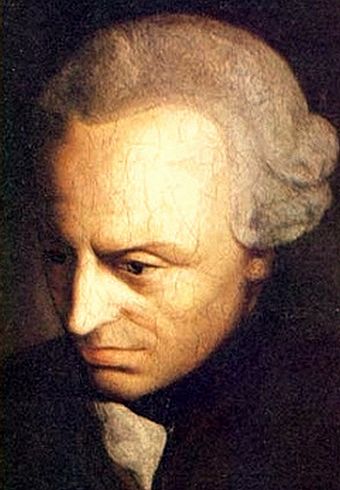233. Schiller’s argument for free will from the experience of the sublime
Kant
Immanuel Kant, in his Critique of the Power of Judgment (1790), offered the most influential and interesting theory of delightful terror or the sublime. He discusses two forms of the sublime in sections 25-28 of his book, namely, the mathematical and the dynamic (you can read the sections as well as the whole book here). In this post I want to briefly discuss Kant’s account of the dynamic sublime and then show how Friedrich Schiller uses it to construct an interesting argument for free will.
In an experience of the dynamic sublime we experience something not boundless in magnitude as in the mathematical sublime but boundless in might that threatens to destroy us. But this might must be perceived in a safe and disinterested manner which removes it from any survival imperative: “He who fears can form no judgement about the Sublime in nature; just as he who is seduced by inclination and appetite can form no judgement about the Beautiful. The former flies from the sight of an object which inspires him with awe; and it is impossible to find satisfaction in a terror that is seriously felt.” Kant offers some examples of the sublime in nature: “Bold, overhanging, and, as it were, threatening rocks, thunderclouds piled up the vault of heaven, borne along with flashes and peals, volcanoes in all their violence of destruction, hurricanes leaving desolation in their track, the boundless ocean rising with rebellious force, the high waterfall of some mighty river, and the like, make our power of resistance of trifling moment in comparison with their might.”

John Martin, The Great Day of His Wrath (circa 1851)
Such experiences trigger us to imagine successful resistance to this might. In doing so we
(1) experience imaginary fear when we can’t imagine how, as human bodies, we can resist the seemingly boundless might.
But then
(2) we imagine ourselves courageously resisting nonetheless. This form of imaginary resistance makes us aware that we can transcend our physical fear and respond as free persons rather than determined bodies. And this capacity for free, independent action is the dynamic sublime. Our experience of this capacity produces a feeling of self-esteem that replaces fear. Indeed, this capacity is the condition for the possibility of such esteem since without it we would be left with the despair of inevitable physical destruction.
Thus the mighty forces of nature or man are not sublime. But they help us experience what IS sublime, namely, OUR CAPACITY FOR FREE, INDEPENDENT ACTION.

Philip James de Loutherbourg, Storm and Avalanche near the Scheidegg in the Valley of Lauterbrunnen (1804)
Kant puts it this way: “The irresistibility of the might of nature gives us to recognize our physical helplessness, considered as creatures of nature, but at the same time reveals ourselves as independent of it and a superiority over nature on which is founded self-preservation of quite another kind than that which may be attacked and brought into danger by the nature outside us, one where the humanity in our own person remains undefeated.”
So we have what Kant refers to as a “vibration”: not between pleasure and displeasure (terms Kant uses only with the mathematical sublime) but between fearfulness and self-esteem. It is this struggle which allows him to account for the delightful terror of the dynamic sublime. Our victory in this struggle, our awareness of ourselves as free, allows us to see a way in which our reason has a “supersensible” aspect which seems to transcend our finite bodies in space and time.
Kant can be interpreted as presenting a transcendental argument which shows how the idea of the dynamic sublime, the idea of our freedom, must be presupposed if we are to make sense of our aesthetic experience. This argument can be formulated as follows:
Premise 1: In the face of boundless physical might we experience, on the one hand, the fearful failure of our imagination to create an image of successful bodily resistance and, on the other hand, the self-esteem that comes with the realization that we can courageously resist such might no matter what the consequences.
Premise 2: If we didn’t have free will or a supersensible independence from physical nature then we would only admit defeat and would never experience the self-esteem which the awareness of our independence includes.
Conclusion: Therefore the possession of free will or the ability to act independently of nature is the condition for the possibility of having an aesthetic experience of the dynamic sublime.
But despite this account Kant is well-known for arguing we can’t demonstrate the existence of free will. In his Critique of Practical Reason he claims it is rational to postulate it to make sense of our moral lives which, after all, appear to assume it as we praise, blame, and engage in dishing out just deserts. And here he is doing something similar: it is rational to postulate freedom to account for the experience of the dynamic sublime. But, while there are definitely tensions in Kant on this topic of freedom, most would argue his approaches to freedom are not offering logical demonstrations of it.
Friedrich Schiller (1759-1805) by Ludovike Simanowiz
However, in his essay On the Sublime Friedrich Schiller attempts to go beyond merely postulating freedom and offers the following argument:
“In presence of the sublime we feel ourselves sublime, because the sensuous instincts have no influence over the jurisdiction of reason, because it is then the pure spirit that acts in us as if it were not absolutely subject to any other laws than its own. The feeling of the sublime is a mixed feeling. It is at once a painful state, which in its paroxysm is manifested by a kind of shudder, and a joyous state, that may rise to rapture, and which, without being properly a pleasure, is greatly preferred to every kind of pleasure by delicate souls. This union of two contrary sensations in one and the same feeling proves in a peremptory manner our moral independence. For as it is absolutely impossible that the same object should be with us in two opposite relations, it follows that it is we ourselves who sustain two different relations with the object. It follows that these two opposed natures should be united in us, which, on the idea of this object, are brought into play in two perfectly opposite ways.”
This is an interesting argument. Schiller assumes the sublime thing – say an overwhelming storm – is what it is. It is we who have the simultaneous experience of both terror and joy: we experience these things “at once.” So, if we are experiencing the sublime then we must have some kind of duality in our being. If we didn’t have such a duality then we would have to say that opposite properties (terror and joy) are attributable to one and the same subject at the same time and in the same respect. This would violate the law of non-opposition which is stated in Plato’s Republic as follows: “the same thing will not be willing to do or undergo opposites in the same respect, in relation to the same thing, at the same time” (436b8–9). This general metaphysical principle is very similar to Aristotle’s principle of non-contradiction stated in his Metaphysics at 1005b19–20 (“the same attribute cannot at the same time belong and not belong to the same subject and in the same respect”). Plato uses the principle of non-opposition to argue that the soul must have at least three distinct faculties (reason, spirit, and appetite). Schiller is adopting the same strategy and his argument can be presented as follows:
Premise 1: The same thing will not be willing to do or undergo opposites in the same respect, in relation to the same thing, at the same time.
Premise 2: The phenomenon that triggers our experience of the sublime is an object with no duality: it just is what it is.
Premise 3: So the simultaneous and dual experience of the opposites of joy and terror is happening in us.
Premise 4: However, this simultaneous experience of terror and joy at the same time cannot also be the same respect (for this would violate the principle of opposition).
Conclusion: So we must have at least two different aspects of our being to account for these two respects of the sublime.
As we have seen, Schiller, following Kant, argues that the joy we feel in the sublime is related to the moral independence of reason from the body “because the sensuous instincts have no influence over the jurisdiction of reason.” Thus the irreducible aspects of our being are “pure spirit” or “reason”, the seat of freedom, and the body, the seat of our senses and various unfree “sensuous instincts.”
So we see that Schiller, rather than offering a transcendental argument which concludes it is rational to postulate freedom to make sense of the dynamic sublime, offers a deductive argument for freedom based on the dynamic sublime premised on the law of non-opposition whose conclusion is guaranteed to be true if the premises are true.
Read Schiller’s essay on the sublime here.
For my in-depth overview of the Kantian sublime, which also discusses Edmund Burke’s theory of the sublime, go here.
For my other posts on the sublime, go here.


